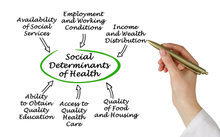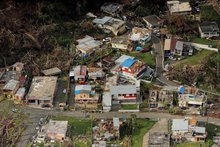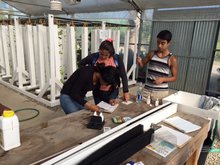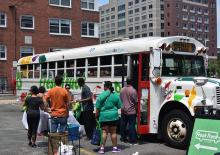Found 28 resources.
0
0
0
Created by the Older Americans Act in 1973, AAAs are part of the national Aging Network. AAAs are the local leaders that develop, coordinate, and deliver a wide range of home and community-based services. These services include information and referral/assistance, case management, home-delivered meals and meals in
congregate settings, in-home services, caregiver supports, transportation, evidence based health and wellness programs, long-term care ombudsman programs, and more. People who receive services provided by AAAs have improved health and well-being, helping them remain in their homes...
Topics: Disabilities, Food insecurity, Homelessness, Housing, Low-income, Seniors, Supportive housing
 Shared by Sandra Ware
on Oct 18, 2022
Shared by Sandra Ware
on Oct 18, 2022 0
0
0
As an Area Agency on Aging (AAA), AgeSpan engages in innovative partnerships with housing providers through the Massachusetts Supportive Housing Program (MSHP). Working with property managers at designated local housing sites, AgeSpan places staff as resident service coordinators (RSCs). The RSCs deliberately build strong, trusting relationships with residents, offering a daily touchstone that greatly improves quality of life. When housing and services are coordinated, older adults and people with disabilities are
better able to live well in the community.
Topics: Disabilities, Food insecurity, Housing, Low-income, Seniors
 Shared by Sandra Ware
on Oct 18, 2022
Shared by Sandra Ware
on Oct 18, 2022 0
0
0
The Low Income Investment Fund (LIIF) will moderate a unique cross-sector panel of housing and early care and education (ECE) experts on strategies and best practices for co-locating ECE facilities within affordable housing developments. Discussion of specific financing techniques and site design considerations from existing co-located facilities will provide attendees lessons on policy and programmatic changes needed to incentivize co-location. Panelists include innovators in affordable housing development, government and public sectors, early care and education operations, and community...
Topics: Advocacy, Broadband, Child welfare, CLPHA, Family engagement, Food insecurity, Health, Housing, Legislation & Policy, Low-income, Nutrition, School-readiness, Supportive housing, Sustainability
 Shared by Karina George
on Jun 17, 2022
Shared by Karina George
on Jun 17, 2022 0
0
0

In California, more than 3.7 million students were eligible for free or reduced priced school meals in the 2017-2018 school year. For many of those students, school meals are the primary source of regular access to healthy food. When the bell rings at 3:00 or lets out for summer break, many of those students go home to nutritional uncertainty or high-calorie, low-nutrient foods.
For many low-income families, the out-of-school-time food access gap increases family stress: limited budgets are stretched further to cover food, rent, utilities, transportation, medications, and chidcare costs....
Topics: Advocacy, Early childhood, Food insecurity, Health, Healthy homes, Housing, Legislation & Policy, Low-income, Nutrition, Out-of-school time, West Coast, Youth
 Shared by Linda Lu
on Dec 4, 2019
Shared by Linda Lu
on Dec 4, 2019 0
0
0

Patients are dealing with stress related to the social determinants of health, including stable housing, food security, and adequate transportation.
Topics: Food insecurity, Health, Housing, Low-income, Nutrition, Transportation
 Shared by Housing Is
on Jun 11, 2019
Shared by Housing Is
on Jun 11, 2019 0
0
0
Child poverty is an urgent and preventable crisis. Solutions to child poverty already exist if we just expand and invest in them. Benefits like nutrition assistance, housing vouchers and tax credits helped lift nearly 7 million children out of poverty in 2017, but millions of children were left behind due to inadequate funding, eligibility restrictions and low wages. We can and must fix these problems to help more children escape poverty now.
Topics: Child welfare, Dual-generation, Early childhood, Food insecurity, Funding, Housing, Legislation & Policy, Low-income, Research, Workforce development
 Shared by Housing Is
on May 28, 2019
Shared by Housing Is
on May 28, 2019 0
0
0
Moving Health Care Upstream (MHCU) is based on the belief that health systems can address persistent and costly health inequities by moving “upstream”—beyond the walls of hospitals and clinics and into the communities, collaborating with community-based organizations to address the root causes of disease. The various areas of work within MHCU share a common focus-supporting hospitals and community stakeholders in testing and spreading strategies to move upstream, and sharing “what works” to inform the field and accelerate the upstream movement in the field as a whole. Policy Learning Labs are...
Topics: Child welfare, Early childhood, Food insecurity, Green, Health, Housing, Legislation & Policy, Nutrition, Partnerships, Youth
 Shared by Housing Is
on May 1, 2019
Shared by Housing Is
on May 1, 2019 0
0
0

Are you a Pennsylvanian without a high school diploma? Then sign up with AmeriHealth Caritas for Medicaid and the plan will help you get your GED. Having trouble getting a job in Ohio? If you are enrolled in CareSource, the Life Services JobConnect in CareSource’s managed care organization (MCO) will arrange job coaching and other employment services at no cost. These are not examples of corporate philanthropy. Rather, they reflect a growing recognition in the health care sector, especially among managed care organizations, that good health—and achieving lower medical costs—requires a focus...
Topics: Education, Food insecurity, Health, Housing, Low-income, Nutrition, Research
 Shared by Housing Is
on Apr 25, 2019
Shared by Housing Is
on Apr 25, 2019 0
0
0

Until recently, efforts to improve the health of Americans have focused on expanding access to quality medical care. Yet there is a growing recognition that medical care alone cannot address what actually makes us sick. Increasing health care costs and worsening life expectancy are the results of a frayed social safety net, economic and housing instability, racism and other forms of discrimination, educational disparities, inadequate nutrition, and risks within the physical environment. These factors affect our health long before the health care system ever gets involved.
Topics: Food insecurity, Health, Housing, Legislation & Policy, Transportation
 Shared by Housing Is
on Apr 23, 2019
Shared by Housing Is
on Apr 23, 2019 0
0
0
With the active support of their residents, HABG converted a 34-passenger bus donated by Warren County Public Schools. The new mobile grocery store will offer fresh fruits and vegetables to families who currently live in a 'food desert' where the cost of eating healthy can be beyond their reach.
HAGB's new mobile grocery store will visit public housing developments and other low-income neighborhoods in Bowling Green to help residents lower their food costs by offering affordable groceries, including fresh produce grown at HAGB. More than 90 residents were surveyed and almost...
Topics: Food insecurity, Health, Housing, Low-income, Nutrition, Place-based
 Shared by Housing Is
on Feb 28, 2019
Shared by Housing Is
on Feb 28, 2019 0
0
0

The U.S. territory needs to urgently tackle issues such as "widespread informal housing" and "the exorbitant amount of abandoned spaces" as it rebuilds after Hurricane Maria.
Topics: Community development, Food insecurity, Funding, Homelessness, Housing, Legislation & Policy, Nutrition, Safety, Stability, U.S. Territories
 Shared by Housing Is
on Feb 4, 2019
Shared by Housing Is
on Feb 4, 2019 0
0
0

Unlike elementary and secondary school students, whose families can get some support from things like federal free breakfast and lunch programs, for college students much of that assistance dries up.
Topics: Education, Food insecurity, Homelessness, Housing, Low-income, Post-secondary, Youth
 Shared by Housing Is
on Jan 28, 2019
Shared by Housing Is
on Jan 28, 2019 0
0
0
A whole host of factors — such as friends, housing and transportation — affect a person’s health and how much they need the social safety net. It’s time the government’s big health insurance programs took this reality into account, some lawmakers and policymakers are starting to argue.
Topics: Asset building, Cost effectiveness, Disabilities, Education, Food insecurity, Funding, Health, Homelessness, Housing, Legislation & Policy, Low-income, Medicaid / Medicare, Seniors, Transportation, Workforce development
 Shared by Housing Is
on Jan 25, 2019
Shared by Housing Is
on Jan 25, 2019 0
0
0
“Families are borrowing from already-limited food budgets to keep a roof over their heads”
Topics: Food insecurity, Housing, Nutrition, Partnerships, Research
0
0
0
Postsecondary attainment is increasingly necessary to move out of poverty and homelessness and live a healthy, productive life. Yet youth experiencing homelessness face barriers in transitioning from secondary to postsecondary education, as well as barriers to financial aid, college retention, and college completion. This fact sheet summarizes existing data and information on the higher education experiences of homeless youth.
Topics: Education, Food insecurity, Homelessness, Housing, Post-secondary, Research, Youth
0
0
0
Massachusetts Attorney General Maura Healey on Tuesday announced $3 million in grants to 13 community organizations that address things like housing, hunger and other societal factors that affect someone’s health.
Topics: East Coast, Food insecurity, Health, Housing, Low-income, Nutrition, Partnerships, Preventative care
 Shared by Housing Is
on Jan 16, 2019
Shared by Housing Is
on Jan 16, 2019 0
0
0
SNAP is the first line of defense against senior hunger and frees up funds for health care and housing. This is important because one way struggling seniors often meet rising health care and other costs is by cutting back on or skipping meals — coping strategies that can exacerbate existing health problems. SNAP improves the health and well-being of seniors by reducing the negative health impacts of food insecurity, including diabetes, hypertension and depression.
Topics: Depression, Disabilities, Food insecurity, Health, Housing, Low-income, Mental health, Midwest, Nutrition, Seniors
 Shared by Housing Is
on Jan 16, 2019
Shared by Housing Is
on Jan 16, 2019 0
0
0

As state and federal officials increasingly search for ways to curb rising health care costs, a decades-old idea is gaining traction: helping people with challenges that have nothing to do with medical care but everything to do with their health.
Topics: Cost effectiveness, Food insecurity, Health, Homelessness, Housing, Low-income, Medicaid / Medicare, Nutrition, Partnerships, Preventative care, Stability, Transportation
0
0
0
Are families prioritizing their housing payments by jeopardizing their health and well-being, missing utility payments, skipping meals, or failing to keep up with medical needs or medical bills? And are renters less able than homeowners to weather a financial emergency, such as an unexpected medical expense? Our research suggests this may be the case.
Topics: Asset building, Child welfare, Food insecurity, Health, Homelessness, Housing, Low-income, Research, Stability
0
0
0

The Housing Authority of the County of Los Angeles (Calif.) developed an innovative community garden to provide access to affordable and fresh food as well as skills training and job opportunities.
Topics: Community development, Food insecurity, Green, Health, Housing, Low-income, Nutrition, Place-based, Sustainability, Youth
0
0
0
The Vita Health & Wellness District is a one-mile corridor in Stamford, Connecticut, that has positioned itself as a “health-themed neighborhood,” offering mixed-income housing, health care services, community farming, early childhood education programming, and supportive services to residents. Led by the city’s public housing authority Charter Oak Communities and Stamford Hospital, this collaboration of city agencies and community-based organizations has focused on building physical and social capacity in a distressed neighborhood, with an emphasis on leveraging collective investments to...
Topics: Community development, Education, Food insecurity, Funding, Health, Housing, Nutrition, Partnerships
 Shared by Housing Is
on Aug 9, 2018
Shared by Housing Is
on Aug 9, 2018 0
0
0
Homelessness among children is correlated with developmental delays, fair or poor health, and high healthcare utilization. Associations of homelessness specifically among infants younger than 12 months, however, are unknown. This study evaluates homelessness during infancy as a risk for adverse infant and maternal health and hardship.
Topics: Child welfare, Depression, Disabilities, Dual-generation, Early childhood, Education, Family engagement, Food insecurity, Grade-level proficiency, Health, Homelessness, Housing, Low-income, Metrics, Partnerships, Pre-natal, Research, School-readiness, Youth
 Shared by Housing Is
on Aug 1, 2018
Shared by Housing Is
on Aug 1, 2018 0
0
0

Health promotion interventions in public housing communities have the potential to reduce obesity among residents, a new study shows. Changes in their environment, such as fresh food trucks, walking groups, screenings, and cooking demos, helped Boston residents eat better and get more exercise.
Topics: East Coast, Exercise, Food insecurity, Health, Housing, Low-income, Nutrition, Obesity, Research
 Shared by Housing Is
on Jul 27, 2018
Shared by Housing Is
on Jul 27, 2018 0
0
0
SAHF members believe that connecting residents of affordable housing with needed supports – such as educational resources or health services – can help vulnerable families and seniors achieve
a better quality of life. SAHF began the Outcomes Initiative to create a common framework for its members to demonstrate with data the impact on residents of providing housing-based services and support in the five key areas listed below.
Topics: Asset building, Cost effectiveness, Dual-generation, Education, Exercise, Food insecurity, Health, Housing, Mental health, Metrics, Nutrition, Safety, Stability
 Shared by Housing Is
on Jul 26, 2018
Shared by Housing Is
on Jul 26, 2018 0
0
0
The Conway Center is a project of a nonprofit housing and services organization, So Others Might Eat, and a federally qualified health center, Unity Health Care, in Washington, DC. This $90 million community development initiative will colocate employment training, health care services, and affordable housing under one roof in Ward 7, an area of DC experiencing high poverty and unemployment, and poor health outcomes. The partnership aims to improve access to affordable rental housing, increase livable-wage job attainment, and connect residents to high-quality health care services. Although...
Topics: Community development, Cost effectiveness, Food insecurity, Health, Housing, Low-income, Medicaid / Medicare, Partnerships, Place-based, Stability
 Shared by Housing Is
on Jul 13, 2018
Shared by Housing Is
on Jul 13, 2018 



